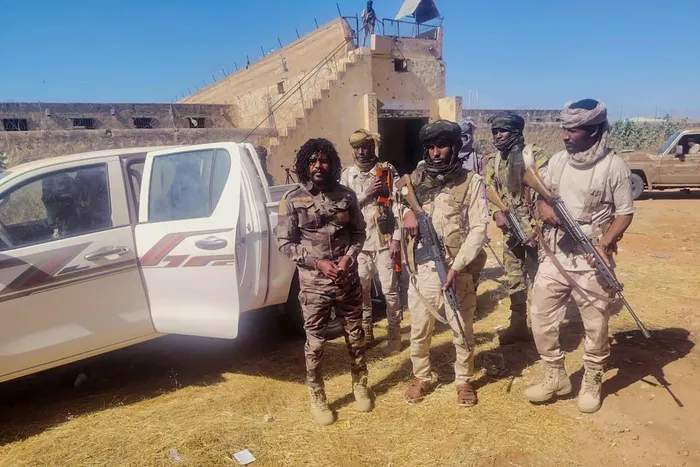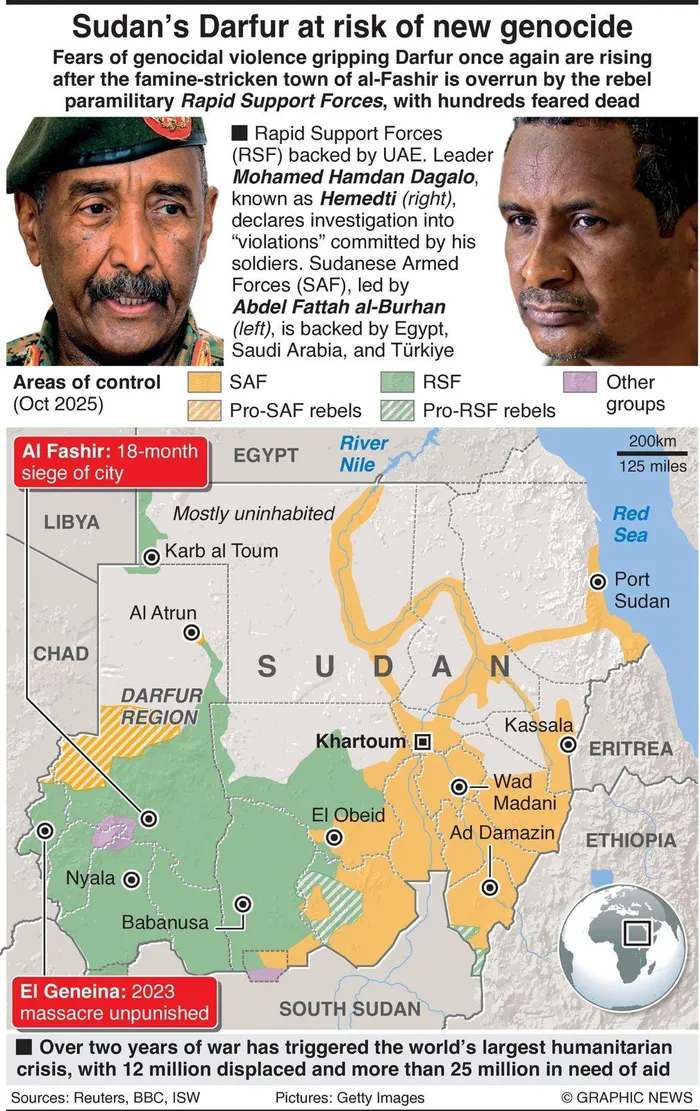The forgotten war: A deep dive into the humanitarian crisis in Sudan

The RSF, at war with the army since April 2023, seized El-Fasher -- the army's last stronghold in Darfur -- on October 26 after an 18-month siege.
Image: Sudanese Rapid Support Forces/AFP
As the global community decries the genocide and ongoing attacks in Palestine and conflicts in the rest of the world, we should draw our attention to a 'forgotten war'. A war that has been happening but received little to no coverage in Western media.
The crisis in Sudan is a catastrophic, man-made civil war that has rapidly escalated into the largest humanitarian crisis ever recorded. It is also the largest and fastest displacement crisis in the world.
What is happening in Sudan and what caused it?
The current crisis is defined by a brutal civil war that erupted on April 15 2023, plunging the country into chaos and accelerating Sudan's collapse.
The civil war comes after the 2019 ousting of long-serving President Omar al-Bashir. A joint military-civilian government that was established afterward was overthrown in a coup in October 2021 by the two men now leading the current conflict.
The fighting started after the two leaders, Gen Burhan and Gen Dagalo, disagreed on the direction of the country and the proposed move towards civilian rule. They specifically disagreed on incorporating the 100,000-strong Rapid Support Forces (RSF) into the army and determining who would lead the newly unified force.
It was believed that both generals wanted to hold onto their respective positions of power, wealth, and influence. The immediate trigger was the redeployment of RSF members around the country, which the army viewed as a threat, leading to the first shots fired on April 15 2023. The IRC Country Director for Sudan states that this crisis is "entirely man-made".

Fears mount over a new genocide in Sudan's Darfur.
Image: Graphic News
Who is involved in the war?
The civil war is being waged between two military factions, namely the Sudanese Armed Forces (SAF) and the Rapid Support Forces (RSF).
SAF is led by Gen Abdel Fattah al-Burhan, who is the head of the armed forces. He is also effectively the country's president. The SAF controls most of the north and east, and Gen Burhan has made Port Sudan his headquarters. The SAF's main backer is believed to be Egypt.
RSF is led by Gen Mohamed Hamdan Dagalo, better known as "Hemedti". The RSF originated from the Janjaweed militia and controls some of Sudan's gold mines, allegedly smuggling the metal to the UAE. The army accuses the UAE of backing the RSF and carrying out drone strikes.
What are the consequences of the war?
The conflict has resulted in widespread death, displacement, famine, and atrocities.
A staggering 30.4 million people, which is more than half of Sudan’s population, are in need of humanitarian support. Over 12 million people have been forcibly displaced since April 2023. Nearly 4 million of these people, mostly women and children, have fled to neighbouring countries like Chad, South Sudan, and Ethiopia.
Tens of thousands have been killed. The death toll exceeds 150,000 across the country. Civilians are subject to frequent attacks and human rights violations.
The children suffer the brunt of the conflict, as Sudan is the world's largest child displacement crisis. Since the conflict began, an average of one child every 10 seconds has been forced to flee their home.
Over 17 million children are out of school, and 11.6 million children face crisis levels of hunger. Over 3,150 grave child rights violations have been reported, including rape, abduction, and forced recruitment.
As if it could not get worse, sexual violence is widespread and gender-based violence is escalating, with reports of intimate partner violence, sexual exploitation, abuse, and trafficking. New mothers are at risk due to the collapse of critical healthcare services.
Horrific stories of mass atrocities continue to emerge, notably following the RSF takeover of El Fasher. At the Saudi Maternity Hospital in El Fasher, 460 patients and their companions were reportedly killed.
Famine and hunger crisis
Sudan is facing one of the world’s worst hunger crises in decades.
More than 24 million people in Sudan are facing acute food insecurity. Over 635,000 people are experiencing famine conditions and a heightened risk of death.
Furthermore, Sudan has more people living in famine conditions than the rest of the world combined.
Violence severely hinders humanitarian organisations' ability to deliver food, and soaring food prices and a collapse in food supplies exacerbate the problem.
War crimes and genocide allegations
The war includes accusations of ethnic cleansing and genocide in the Darfur region. Human Rights Watch (HRW) suggested in March 2024 that the RSF and allied militias might be carrying out a genocide in Darfur against the Massalit people and other non-Arab communities. The widespread killings raised the possibility of "the intent to destroy in whole or in part" the Massalit people.
The United States determined in January that the RSF and allied militias have committed genocide. The US cited the systematic murder of men and boys, deliberate targeting of women and girls for brutal sexual violence, and preventing civilians from accessing lifesaving supplies.
Impact on Sudan’s health system
The war is destroying Sudan’s public infrastructure, leading to a collapsed health system. The country is now "on the brink of a full-scale public health disaster".
The World Health Organization (WHO) verified 285 attacks on healthcare since the conflict began, resulting in at least 1,204 deaths and over 400 injuries of health workers and patients. More recently, WHO verified at least 119 attacks between April 2023 and October 2024.
More than 80% of the country’s hospitals in conflict zones are non-operational.
As hospitals are non-operational, millions lack access to essential medical care as disease outbreaks surge. The combination of conflict, displacement, destroyed infrastructure, and limited access to clean water is fueling deadly diseases. An estimated 3.4 million children under five are at high risk of epidemic diseases.
Over 60,000 cholera cases and more than 1,600 deaths were reported between August 2024 and May 2025. Cholera continues to spread rapidly in El Fasher due to lack of access to safe water.
Health workers have been killed and detained. For instance, 46 health workers have been killed in El Fasher alone, and six were recently abducted from the Saudi Maternity Hospital.
Why you should care
Other than the fact that we are human beings, the crisis in Sudan demands global attention because of its unprecedented scale and severity, and the horrific human cost.
It is the largest humanitarian crisis ever recorded, affecting over half the population, and the fastest displacement crisis globally. Civilians, especially women and children, are subject to rampant sexual violence, human rights violations, and indiscriminate attacks. Children are under siege, facing unimaginable violence, and risking death from starvation and disease.
The famine conditions, affecting more people than the rest of the world combined, are entirely man-made, caused by the ongoing conflict blocking life-saving aid.
Lastly the global indifference is why one should sit up and pay attention. The UN health chief, Tedros Adhanom Ghebreyesus, has lamented the lack of global interest compared to other conflicts, suggesting that "I think race is in the play here". The diplomatic efforts have been labelled "lacklustre" and the world's response "woefully inadequate," making this a "forgotten war" despite the desperate need.
How to help
International organisations urgently call for action to support the people of Sudan.
Donating is a primary way to help support life-saving work in Sudan and neighbouring countries.* The IRC accepts donations monthly, offers ways to start a fundraising campaign, and facilitates planned gifts, stocks, crypto, and tribute gifts. They use funds to provide health, nutrition, WASH, child protection, GBV support, and cash aid. Save the Children accepts donations to protect children's lives and futures. They use funds for integrated health, nutrition, WASH, child protection, education, and cash grant programmes.
International actors are called on to immediately cease hostilities and end the fighting. Allow immediate and unfettered humanitarian access to deliver life-saving aid. Protect civilians, humanitarian aid workers, and health care as mandated under International Humanitarian Law.
IOL
Related Topics: